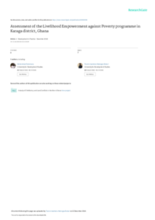ABSTRACT
This article assesses the contribution of the Livelihood Empowerment Against Poverty (LEAP) programme in reducing rural poverty in the Karaga district of Northern Ghana, using a mixed research design to compare the livelihoods of beneficiaries and non-beneficiaries. It concludes that the programme is contributing to poverty reduction among the poor and vulnerable, and recommends that school children benefiting from LEAP should be exempted from paying extra expenses such as examination and PTA fees. There should also be a system to provide subsidies for agriculture inputs to enable beneficiaries to engage in agriculture to promote longer term poverty alleviation.

